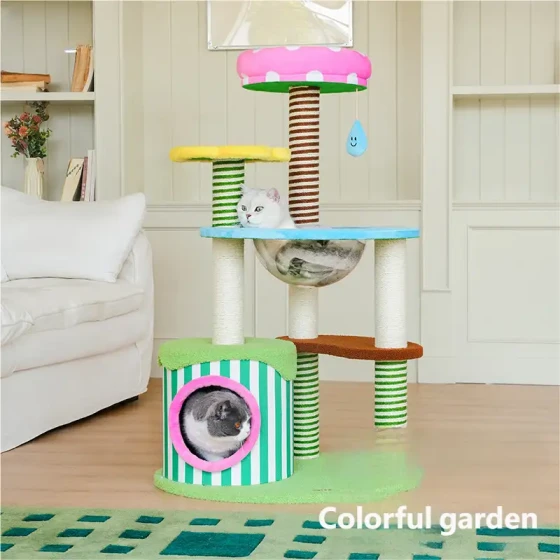Where to Sell Pet Cats_Full Guide to Finding Reliable Cat Trading Channels
If for various reasons you need to find a new home for your pet cat, whether choosing to sell or give away for free, finding a reliable trading or adoption channel is crucial. This not only affects whether you can smoothly find a new home for your cat, but more importantly ensures your furry child goes to a safe, loving, and responsible new environment. Generally speaking, finding reliable pet cat trading channels can start from professional catteries, reputable pet stores, standardized online platforms (which should be carefully screened), as well as your own social circles and pet adoption organizations.

When life changes, you may no longer be able to continue caring for your beloved cat. At this time, finding a new home for it is a responsible act, not abandonment. Choosing the right channel can help you maximize the quality of life your cat will have in the future. Here are some reliable channels you can consider and their precautions:
1. Professional Catteries and Breeders: Finding a “Well-Matched” New Home for Purebred Cats
If the cat you want to sell has a pedigree certificate, contacting professional catteries or breeders may be a good choice. These organizations or individuals usually have in-depth knowledge of specific cat breeds and can provide professional care for the cats.
- Advantages: New owners may have more professional knowledge of the breed and can provide better care; the transaction process is relatively standardized and sometimes involves signing agreements.
- Precautions: Be sure to check the qualifications and reputation of the other party, understand their breeding environment and cat welfare conditions. Avoid selling cats to pet dealers or breeding facilities with poor conditions. As for price, professional breeders might price according to the cat’s pedigree, health status, age, and other factors.
2. Offline Pet Stores: Convenient but Require Careful Scrutiny
Some reputable, larger offline pet stores may also offer consignment or sales services, or they may themselves have channels to find new owners.
- Advantages: Physical stores are visible and feel more reassuring; the transaction process may be more convenient.
- Precautions: This requires special caution! Not all pet stores are reliable. Some pet stores have dirty and poor environments and pay insufficient attention to animal welfare. Be sure to inspect the pet store environment, the professionalism of the staff, understand the cat’s living conditions during its stay in the store, and how they find buyers. Make sure cats are not treated as mere “commodities.” Clarify the charging standards in advance.
3. Online Pet Trading Platforms: Rich Information but Risks Coexist
In the internet era, various online pet trading platforms and information publishing platforms abound. You can post selling information of your cat on these platforms to attract potential buyers.
- Advantages: Wide range of information dissemination, many potential buyers.
- Precautions: Extremely high risk! Online platforms are mixed with a large amount of false information, scams, and irresponsible buyers. Many platforms do not have strict verification systems for sellers and buyers. When choosing an online platform, be sure to select those with certain recognition, user evaluation systems, or some verification processes for sellers (although truly strict platforms are rare).
- Core suggestion: Even if you find potential buyers on an online platform, do not complete all transactions online. Always insist on meeting offline, inspecting the buyer’s living environment (if conditions allow or distance is not far), communicating in depth with the buyer, and confirming they truly love cats and have the ability to care for them. Also, protect your personal privacy and beware of scams. Use online platforms as information sources, but actual transactions and inspections must be offline.
4. Social Media and Local Groups: Familiar Recommendations Are More Reliable
Post information about needing to find a new home for your cat on social media platforms like WeChat, Weibo, Douban, or join local pet groups, residential owner groups, etc., and use your social network to look for potential buyers or adopters.
- Advantages: Information directly reaches circles with higher trustworthiness; easier to understand the background of potential receivers; the process may be more personable.
- Precautions: The range of information dissemination is relatively limited. When posting in local groups, be wary of strangers and be sure to judge the suitability for adoption or purchase through multi-faceted communication and understanding. Recommendations among friends and family are usually more reliable.
5. Pet Adoption Agencies: When “selling” Becomes “Adopting Out”
If your purpose of selling the cat is not for profit but simply to find it a good home, then contacting professional pet adoption agencies or animal rescue organizations is highly recommended.
- Advantages: Agencies usually have strict screening mechanisms for adopters and can match cats with the most suitable families; prevent cats from ending up with irresponsible people; this is a more responsible way concerning animal welfare.
- Precautions: Sending cats to adoption agencies usually means you won’t receive income from selling the cat, and might even have to pay some boarding or inspection fees. Additionally, agencies have limited resources and space and may require waiting in line. However, considering the cat’s future, this is often one of the safest and most reliable channels.
How to Choose a Reliable Recipient (Whether Selling or Adopting):
No matter which channel you use to find a new home for your cat, the following points must be considered when evaluating potential recipients:
- Understand their pet-keeping experience and home environment: Have they kept cats before? How much do they know about cat care? Are all family members (including children or other pets) accepting of cats? Is the living environment safe (e.g., are windows sealed)?
- Observe their interaction with the cat: When meeting, watch how they interact with your cat and whether the cat seems relaxed and likes them.
- Ask about their feeding plan and financial ability: Understand how they intend to feed and care for the cat and whether they can afford food, toys, medical expenses, etc.
- Sign a transfer agreement (recommended): A simple agreement can clarify the responsibilities of both parties and the cat’s destination, such as clauses forbidding resale or abandonment. Although the enforceability is limited, it shows both sides take this transfer seriously.
- Provide detailed information and items for the cat: Provide the new owner with the cat’s health status, vaccination records, deworming records, sterilization status, feeding habits, personality traits, preferences, prohibited foods, etc., and try to provide familiar items like cat food, toys, and cat beds to help the cat adapt more quickly to the new environment.
- Keep contact information and suggest regular follow-up visits: With the new owner’s consent, keep their contact details to learn about the cat’s adaptation. Responsible new owners usually don’t mind sharing updates about the cat’s life.
Frequently Asked Questions
- Q: How should I price my cat?
A: If giving away for free, no pricing is needed. If selling, the price usually depends on the cat’s breed, pedigree certificate, age, health, sterilization status, and other factors. Purebred cats are priced higher; ordinary local or mixed-breed cats are lower, sometimes even transferred at “bargain prices” or along with cat supplies. But remember, finding someone who truly loves and is capable of responsibly caring for the cat lifelong is much more important than a high price. Sometimes lowering the price or free adoption can even filter out people who just want a “toy” or have improper uses. - Q: Can I sell cats online? Is it safe?
A: You can post information online, but directly completing transactions online carries high risks. Online info is mixed and hard to verify, making scams common. Even if you find buyers, it is strongly recommended to insist on offline meetings and inspections to ensure the cat’s safety and reliability of the new home. The safest online method may be through acquaintances’ recommendations or joining pet communities with strict review systems. - Q: What if I can’t find a buyer?
A: If you can't find a suitable buyer or adopter for a long time, don’t give up easily or choose abandonment. Consider contacting local rescue organizations or individual breeders for help. Also, expand your search channels by trying different platforms or methods. If conditions permit, consider boarding your cat in reputable pet stores or foster families and continue looking for a new home. - Q: What documents are needed when selling a cat?
A: Although the law does not require individuals to provide specific documents when selling pet cats, to increase buyer trust and ensure the cat’s health, it is recommended to proactively provide the cat’s immunization certificates (vaccine booklet), deworming records, and if sterilized, related certificates. These documents show your responsibility for the cat’s health and help new owners understand the cat’s situation better.
Summary
Finding a new home for a pet cat is a process that requires careful consideration. Whether selling or adopting out, the core goal is to find a responsible new owner who can provide a stable, healthy, and loving living environment for the cat. Publish information through professional channels, reliable platforms, or trustworthy social circles, and be sure to carefully evaluate and understand potential recipients. Remember, your beloved cat deserves a beautiful future.





